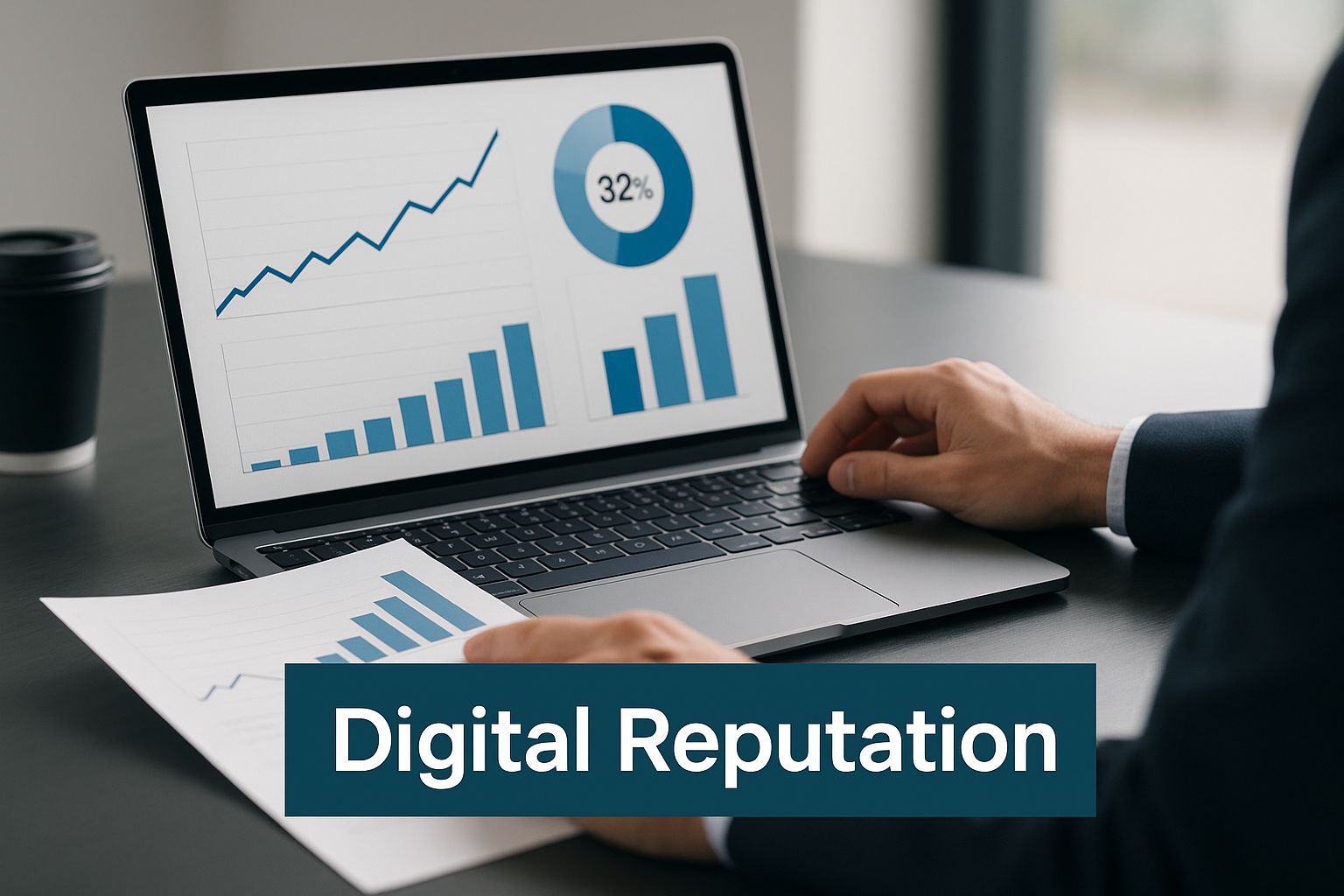
Let's be blunt: digital reputation management isn't some fluffy PR task. It's the craft of controlling the story people find when they Google you or your company. This isn't just damage control; it's about proactively building a narrative that closes deals, attracts talent, and increases your valuation.
Your Digital Reputation Is Your Bottom Line
Let's cut to the chase. Your digital reputation is a cold, hard lever that moves revenue. As founders, we get tunnel vision on product and growth, but we often ignore the one asset that underpins it all: our reputation.
A single negative Reddit thread can sour an investor meeting. A few one-star reviews can quietly torpedo conversion rates. That's why digital reputation management is a core business function, not a task you delegate and forget.
The game has moved beyond just "managing complaints." The real work is in building a durable brand narrative—one that not only deflects negativity but actively pulls in new business.
From Defensive Chore to Offensive Asset
When you get proactive about your reputation, it stops being a chore and becomes a growth engine. A well-managed online presence becomes your best salesperson, working 24/7.
This infographic really drives home how central your digital reputation is to the overall health of your business.

As the image shows, a strong digital reputation is the foundation that supports everything else, from sales and marketing to hiring and fundraising.
This proactive approach turns your reputation into a real asset with clear, measurable benefits:
- Drives Customer Acquisition: Great reviews are social proof. They lower your CAC and make it easier for people to say "yes."
- Attracts Top Talent: The best candidates do their homework. A positive footprint makes your company a place where top performers want to work.
- Builds Investor Confidence: Investors dig deep. A clean digital presence tells them you're a well-run company, instantly reducing their perceived risk.
The financial stakes here are massive. The online reputation management market is set to explode, growing from $4.5 billion to an estimated $17.4 billion by 2032. This isn't just hype; it's a reaction to the real costs of a damaged reputation, where one viral incident can wipe out seven figures in market value overnight. Digging into why online reputation is important shows just how much perception can make or break your company's market standing.
The Real-World Impact on Founders
You'd never leave your company's bank account unguarded. Why would you leave its digital equivalent—your reputation—wide open? Every tweet, review, and blog comment adds up, creating a public record that customers, partners, and investors will check long before they ever call you.
As founders, our brand and personal reputations are intertwined. What people find when they Google your name is just as important as what they find when they Google your company. Controlling that narrative is not vanity; it's essential valuation protection.
This guide isn't theory. We're going to walk you through the exact playbook we use inside BillyBuzz to turn reputation management from a reactive firefight into a predictable system for building a brand that wins.
The Four Pillars of Reputation Management
At BillyBuzz, our approach to digital reputation management is a system, not a collection of abstract theories. This is the operational framework we use every day. We organize everything around four key pillars that work together to build and protect your brand's story.
Think of it like building a fortress. If one pillar is weak, the whole thing is vulnerable.

This is a repeatable system you can start using today. Let's break down each pillar.
Pillar 1: Proactive Monitoring
You can't manage what you don't see. Proactive Monitoring is our early-warning system that picks up whispers before they become roars. For us, this means going way beyond simple alerts for your brand name.
Inside the BillyBuzz platform, this is literally what our setup looks like:
- Targeted Subreddits: We don't just watch
r/all. We have specific alerts for niche subreddits liker/SaaS,r/fatFIRE,r/marketing, andr/Entrepreneurwhere real, unfiltered conversations happen. - Competitor Keywords: We track our top competitors. When someone posts "I'm frustrated with [Competitor X]," that's a buying signal for us.
- Problem-Based Keywords: We monitor phrases related to the problems we solve. For example, our alerts fire for "find reddit leads," "monitor subreddit mentions," and "best alternative to [Old Tool]." This finds people actively looking for a solution.
This pillar ensures we're always the first to know when our brand is part of a relevant conversation.
Pillar 2: Rapid Response
Online, speed is everything. A comment left hanging for 24 hours can spiral out of control or become a massive missed opportunity. Rapid Response is our system for engaging quickly and effectively.
This isn’t just for putting out fires. It’s also about jumping on positive mentions to amplify them and engaging with neutral questions to build a reservoir of goodwill.
A fast, empathetic response to a negative comment can often turn an unhappy customer into a public advocate. It shows everyone else watching that you care and that you're listening.
We rely on pre-approved response templates to maintain consistency and speed. For a negative comment, our go-to initial template acknowledges the issue, shows empathy, and moves the conversation to a private channel (DMs/email). This de-escalates public drama and lets us solve the problem one-on-one.
Pillar 3: Content Fortification
The best defense is a good offense. Content Fortification is our long-term strategy for building a wall of positive, high-quality assets that we control. The objective is simple: when someone Googles your brand, the first page should be dominated by content that tells your story.
This SEO strategy is called SERP control. Our favorite assets for this include:
- In-depth founder interviews on relevant podcasts.
- Detailed customer success stories on our blog.
- Fully optimized personal LinkedIn profiles for key executives.
- Guest posts on high-authority industry publications.
Think of each piece as another brick in your digital fortress, pushing potential negativity down to page two, where it dies.
Pillar 4: Sentiment Analysis
Finally, you measure what matters. Sentiment Analysis is how we move beyond counting mentions to understanding the feeling behind them. Are people happy, frustrated, or neutral?
This pillar provides the data that shapes the strategy for the other three. A sudden dip in sentiment might trigger a deep dive to find a product bug. A spike in positive sentiment after a launch tells us our roadmap is on track.
At BillyBuzz, our platform automatically tags every mention as positive, negative, or neutral. We track our Net Sentiment Score (positive vs. negative mentions) weekly. This gives us a real-time pulse on brand health.
The Four Pillars of Digital Reputation Management
Here’s an overview of our operational system at BillyBuzz.
| Pillar | Objective | Key Activities |
|---|---|---|
| Proactive Monitoring | To build an early-warning system that catches brand mentions in real time across key online channels. | Set up keyword tracking in r/SaaS, r/startups. Monitor competitors and problem-based keywords like "social media monitoring tool." |
| Rapid Response | To engage with conversations quickly and effectively, turning potential crises into opportunities. | Use response templates. Engage with positive/neutral mentions. De-escalate negative feedback and move to DM. |
| Content Fortification | To control the first page of Google search results for branded keywords with positive, owned assets. | Publish guest posts, founder interviews, case studies, and press releases. Optimize LinkedIn profiles. |
| Sentiment Analysis | To measure the overall feeling behind conversations and use that data to inform strategy. | Track Net Sentiment Score weekly. Analyze sentiment dips to identify product or service issues. |
By consistently working these four areas, you create a robust system that not only defends your brand but actively builds a stronger reputation over time.
Building Your AI-Powered Listening Engine
As a founder, manually searching for your brand's name is a waste of time. You'll miss the conversations that matter. A real digital reputation management strategy needs a system—an automated listening engine that works 24/7, cutting through the noise.
This is exactly how we build that engine for ourselves inside BillyBuzz.
The point is to catch whispers before they become roars. Your listening engine has to go beyond your company name. You need to build a curated keyword list that catches every relevant signal.
Crafting Your Keyword Monitoring List
At BillyBuzz, our monitoring lists are built around four core categories. This setup finds not just direct mentions but crucial conversations happening around our brand.
- Brand & Product Keywords: The basics. Company name, product names, common misspellings. For us: "BillyBuzz," "Billy Buzz," and sometimes "BillyBuz."
- Executive Keywords: Your personal rep is tied to the company's. We monitor the names of key executives and founders.
- Competitor Keywords: We watch our top two or three competitors. When someone posts, "I'm so frustrated with [Competitor X]," that's a red-hot lead.
- Problem-Based Keywords: The magic bullet. We monitor phrases that describe problems we solve, like "find reddit leads" or "monitor subreddit conversations." This is how you find customers who don't know you exist yet.
Once you have this list, you aim your listening engine at the right places and filter out the junk.
Setting Up Smart Alerts and Filters
A listening engine without filters is just noise. The value comes from specific alert rules that flag high-priority mentions. We’ve found the best conversations happen in high-signal, low-noise environments.
The most honest feedback and highest-intent leads come from niche online communities, not broad social media platforms. Your ability to listen in these specific corners is a huge competitive advantage.
Our primary targets inside BillyBuzz are:
- Niche Subreddits: We have alerts running for communities like
r/startups,r/SaaS, andr/marketing. These are the digital town squares where our ideal customers hang out. - Industry Forums: We identify and monitor smaller, industry-specific forums where professionals gather.
- Key Twitter Accounts: We track mentions from influential journalists, analysts, and power users in our industry.
This targeted approach ensures our alerts are packed with context. A mention in r/SaaS is 100x more valuable to us than some random tweet. For a deeper look at how to create these, check out our guide on setting up AI-powered social media alerts for real-time monitoring.
Using AI for Triage and Prioritization
Okay, mentions are flowing in. Now what? This is where AI becomes a founder's secret weapon. We use AI to automatically triage every mention, tagging it with sentiment and urgency so our team knows what to jump on first.
This dashboard view shows how mentions get categorized automatically, letting us see what needs immediate attention.
The real power here is sorting by negative sentiment or source. It helps us prioritize a critical comment on Reddit over a neutral mention in a news article every time.
Modern online reputation management has moved past static ratings and into the world of dynamic, real-time engagement. Success today is measured by things like response time, review velocity, and sentiment trends—all powered by AI. Customers now expect a response in hours, not days, whether they're on Google, Yelp, TikTok, or even ChatGPT. To learn more about this shift, you can discover insights on how AI is changing ORM on soci.ai. This system of automated monitoring and AI-powered triage is the only way to keep up.
The Founder's Playbook for Responding
An alert fires. Your listening engine flagged a critical comment on Reddit. This is the moment of truth for your digital reputation management strategy. As founders, our first instinct is to defend our baby. That’s almost always the worst move.
At BillyBuzz, we run a disciplined playbook. It’s not about generic PR jargon; it's about crafting genuine responses that can cool down a negative situation or pour fuel on a positive one.
The stakes are high. 93% of consumers say online reviews shape their buying decisions. A single negative review can turn away 30 potential customers. Having a plan isn't just helpful—it's essential for survival. You can see more of these eye-opening reputation stats on Nadernejad Media.
Our Internal Response Templates
We don't reinvent the wheel. We use battle-tested templates that we copy, paste, and customize. This keeps our responses fast and our tone consistent.
Scenario 1: The Critical Reddit Comment
Goal: De-escalate fast and move the conversation private.
- Template: "Hey [Username], thanks for the honest feedback. I'm one of the founders here, and I'm genuinely sorry you've had this experience. That's definitely not the standard we're aiming for. I'd really like to get this sorted for you personally. Could you shoot me a DM or an email at [founder@company.com]? I want to understand what happened and make it right."
This acknowledges their frustration, offers a sincere apology, and provides a private channel for a solution—without getting defensive.
Scenario 2: The Glowing G2 Review
Goal: Amplify positivity and show you're paying attention.
- Template: "Wow, [Reviewer Name], thank you for such a detailed and thoughtful review! The team and I just read it, and it absolutely made our day. We're especially thrilled you found [Specific Feature Mentioned] so helpful—we poured a lot of hours into that. Thanks for being part of our journey!"
It’s personal, grateful, and proves you actually read their review.
Scenario 3: The Neutral Twitter Question
Goal: Be genuinely helpful and build goodwill.
- Template: "Great question, [Username]! Yep, you can do that by heading to Settings > Integrations. Here’s a quick link to our help doc with screenshots: [Link to Docs]. Let me know if that doesn't get it done for you!"
Simple, direct, and immediately valuable.
The Anatomy of a Winning Response
Every effective response has three core ingredients. It’s a simple formula that just works.
- Acknowledge & Empathize: Start by validating how they feel. "I can see why you'd be frustrated" immediately lowers their guard.
- Offer a Solution (or a Path to One): Give a clear next step. This could be an answer, a link, or an invitation to connect privately.
- Keep it Human: Ditch the corporate-speak. Use "I" and "we." Be conversational. People connect with people, not logos.
The Most Important Rule: When Not to Engage
Sometimes, the smartest move is to say nothing. As a founder, this is the hardest rule to follow. Your gut will scream at you to correct a false statement or fight back against a troll. Resist.
Engaging with a troll or a deliberately inflammatory comment is like pouring gasoline on a fire. You will never win. You will only amplify their message. Your silence starves them of the attention they crave.
We have a strict "do not engage" policy for any comment that is clearly trolling or abusive. We simply use the platform's tools to block, mute, or report the user. It protects our team's sanity and keeps the conversation focused.
Building a Digital Fortress with SEO
The best way to handle your digital reputation management isn't to wait for a crisis. It’s about building a digital fortress—a collection of positive, high-ranking content that you own and control. This shields your brand from negativity before it starts.
At BillyBuzz, we call this SERP control. The idea is simple: when someone Googles your brand, you want the entire first page to be filled with assets that tell your story, in your words.

This approach shoves any potential negative press onto page two of Google, where less than 1% of users ever click.
The Right Content for Dominating Your Brand's Search Results
So, what content actually works? Google gives preferential treatment to certain types of content, especially high-authority pieces from third-party sites.
Here’s our go-to checklist for building that digital fortress:
- In-Depth Founder Interviews: Getting your founder featured on a respected industry podcast or in a written interview is pure gold. It offers powerful, third-party validation that Google’s algorithm loves.
- Detailed Customer Success Stories: Deep-dive case studies that walk through how a real customer solved a painful problem using your product. It’s authentic social proof that ranks.
- Company Culture Pieces: Articles that highlight your company's mission or values help humanize your brand and are exactly the kind of stories that industry publications feature.
- Polished Social Profiles: A fully built-out LinkedIn profile for the company and its founder is non-negotiable. Google treats these as primary, authoritative sources.
Each of these acts like another brick in your wall.
A Simple Content Plan for SERP Control
This doesn’t happen overnight. It takes a steady, methodical approach. We use a simple content calendar to ensure we're consistently putting out assets designed to rank for our brand name.
Here’s a sample quarterly plan any founder can use:
| Month | Primary Content Asset | Secondary Asset |
|---|---|---|
| Month 1 | Pitch and record one founder podcast interview. | Publish one detailed customer success story on the blog. |
| Month 2 | Write and publish a guest post on an industry blog. | Fully optimize the founder's LinkedIn profile with new media. |
| Month 3 | Create a "behind-the-scenes" company culture video. | Pitch a second founder interview or written Q&A. |
This slow-and-steady rhythm is realistic for a busy founder. Each month, you're adding one or two more positive results to your digital footprint.
Over six to twelve months, this consistent effort completely changes your search results. You stop just reacting to what others are saying and start proactively defining what people find.
This proactive content strategy is the real game-changer. By focusing on SEO, you're not just playing defense—you’re playing offense. Interestingly, these very conversations and stories can also influence AI models. To see how, you can read more about how AI SEO in 2025 uses Reddit conversations to get cited by tools like ChatGPT.
Measuring What Matters for Your Reputation
If you aren't measuring your digital reputation management efforts, you can't prove they’re working. As founders, we live by ROI. It's time to forget vanity metrics like follower counts. At BillyBuzz, we zero in on core metrics that paint a real picture of our brand's health.
The goal is to turn "brand perception" into cold, hard data you can show your board. This is how you justify the investment.
The Metrics We Track at BillyBuzz
We obsess over three key performance indicators (KPIs) that give us a clear, actionable snapshot.
Share of Voice (SOV): How much of the conversation in our space do we own? We calculate it by pitting our brand mentions against our top competitors' mentions over 30 days. If SOV is climbing, our content is working.
Net Sentiment Score (NSS): Our brand's real-time pulse. It's the ratio of positive to negative mentions. Tracking this weekly helps us catch trends before they become problems. A sudden dip can be an early warning for a product bug. You can see powerful ways to visualize this data by learning about sentiment graphs for brand monitoring and how they turn complex data into something you can understand at a glance.
SERP Control: A simple percentage. When someone Googles your brand, what percentage of the top 10 results do you own? We aim for at least 70% SERP control, including our website, social profiles, and positive press. This metric directly measures the strength of your digital fortress.
As a founder, your time is your most precious resource. Focusing on these three metrics cuts through the noise and tells you exactly where you stand and what you need to do next.
This no-nonsense approach lets us see what’s working, fast. For a deeper dive into making sense of your impact, explore some comprehensive guides on metrics and reporting.
When you start presenting this data, you turn reputation from a fuzzy concept into a tangible business asset.
Frequently Asked Questions
As founders, we've heard every question there is about digital reputation management. Here are the most common ones with straight answers.
How Soon Should I Start Managing My Digital Reputation?
Yesterday. The next best time is now.
Think of it like business insurance—you set it up before you need it. Proactive reputation management is always cheaper and more effective than scrambling to fix a problem after it blows up. Start building your positive presence and setting up monitoring from day one.
Can I Handle Reputation Management Myself, or Do I Need an Agency?
You can absolutely start on your own. Using the tools and strategies here, any founder can take control. The key is consistency. A simple process you follow weekly will do more than a sophisticated strategy you only use quarterly.
As you grow, you might hand this off to a team member or bring in specialists (like us!). That way, you can stay focused on building the business.
What Is the Single Biggest Mistake Founders Make?
Ignoring negative feedback. Or, even worse, responding emotionally. Firing back with a defensive or angry comment is like pouring gasoline on a fire. It can escalate a minor complaint into a full-blown public crisis.
The golden rule is to respond quickly, calmly, and with empathy. Acknowledge the feedback, and then immediately move the conversation to a private channel like email or DMs to find a resolution.
How Do I Handle a Completely False Review?
This is tough. Resist the urge to fight back publicly. Don't engage.
First, report the review to the platform. Most sites have policies against fake content and will remove it if it violates their rules.
While you wait, your best defense is a good offense. Your primary strategy should be suppression—drowning out the bad with the good. Kick off a campaign to generate a flood of new, genuine, positive reviews. This will push the fake one so far down the page that most people will never see it.
Ready to stop guessing and start building a resilient brand narrative? BillyBuzz gives you the AI-powered tools to monitor the conversations that matter and turn them into growth opportunities. Discover hidden leads on Reddit today!
